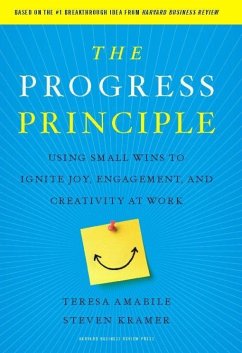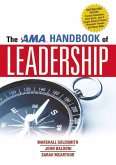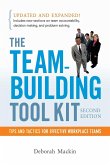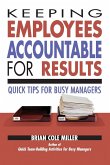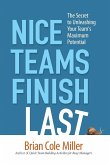What really sets the best managers above the rest? It's their power to build a cadre of employees who have great inner work lives-consistently positive emotions; strong motivation; and favorable perceptions of the organization, their work, and their colleagues. The worst managers undermine inner work life, often unwittingly.
As Teresa Amabile and Steven Kramer explain in The Progress Principle, seemingly mundane workday events can make or break employees' inner work lives. But it's forward momentum in meaningful work-progress-that creates the best inner work lives. Through rigorous analysis of nearly 12,000 diary entries provided by 238 employees in 7 companies, the authors explain how managers can foster progress and enhance inner work life every day.
The book shows how to remove obstacles to progress, including meaningless tasks and toxic relationships. It also explains how to activate two forces that enable progress: (1) catalysts-events that directly facilitate project work, such as clear goals and autonomy-and (2) nourishers-interpersonal events that uplift workers, including encouragement and demonstrations of respect and collegiality.
Brimming with honest examples from the companies studied, The Progress Principle equips aspiring and seasoned leaders alike with the insights they need to maximize their people's performance.
As Teresa Amabile and Steven Kramer explain in The Progress Principle, seemingly mundane workday events can make or break employees' inner work lives. But it's forward momentum in meaningful work-progress-that creates the best inner work lives. Through rigorous analysis of nearly 12,000 diary entries provided by 238 employees in 7 companies, the authors explain how managers can foster progress and enhance inner work life every day.
The book shows how to remove obstacles to progress, including meaningless tasks and toxic relationships. It also explains how to activate two forces that enable progress: (1) catalysts-events that directly facilitate project work, such as clear goals and autonomy-and (2) nourishers-interpersonal events that uplift workers, including encouragement and demonstrations of respect and collegiality.
Brimming with honest examples from the companies studied, The Progress Principle equips aspiring and seasoned leaders alike with the insights they need to maximize their people's performance.
"It's a very instructive read that I highly recommend... a groundbreaking book." -Huffington Post
"In The Progress Principle, Teresa Amabile and Steven Kramer have provided an inspiring combination of solid scientific research and management insight. They have succeeded in bringing to life a new paradigm in management, fully supported and elegantly presented." - Research-Technology Management
"This practical orientation for managers makes the book an important resource for organizations experiencing a decline in productivity and employee engagement." - CHOICE Magazine
"Filled with honest, real-life examples, compelling insights, and practical advice, The Progress Principle equips aspiring and seasoned leaders alike with the guidance they need to maximize people's performance." -Innovation Watch
"The Progress Principle by Teresa Amabile and Steven Kramer is a masterpiece of evidence-based management-the strongest argument I know that "the big things are the little things." A masterpiece every manager should have...I believe it is one of the most important business books ever written." -Bob Sutton
"The book...is one of the best business books I've read in many years." -Daniel Pink
"But in singling out one book that offers the most important message for managers this year, I recommend The Progress Principle. The breakthrough in knowledge it provides makes it my choice as best business book of the year. This a pioneering work on employee engagement, with lots of memorable examples culled from those in-the-trenches diary entries." -The Globe and Mail
"You will never return to the older and outmoded theories of employee motivation again." -Blog Business World
"When Bob Sutton, a leading management professor at Stanford University, says a new book "just might be the most important business book I've ever read," the rest of us should take notice. Sutton is right. The Progress Principle is...fantastic. I am a big fan of this book, and I have decided to make it one of the alternate end-of-semester book assignments for the master's students in my introductory public management course this fall." -Steve Kelman, Federal Computer Week
"This is the roadmap to how to create progress, even baby steps through small wins, and therefore create a culture that supports a meaningful and joyful "inner work life", which is the secret to great leadership and harnessing the best of employee psychology." -Innovative Influence (Suzi Pomerantz's Blog)
"Those who appreciate the work of people like Dan Pink (Drive), Chip Conley (Peak) should seriously consider adding The Progress Principle as the third member of a very compelling trio of books offering just about everything you need to know about tapping the deepest wells of human creative performance." -Matthew E. May, Guru Forum (American Express)
"...the authors have done a good job in reminding us all that "it's people, stupid" who lie at the heart of successful organisations." -Nita Clarke, People Management Magazine (UK)
"This book is a must read for those wants to be good leaders (or those wishing they worked for one)." -LeaderLab
"It's a clear guide that can help managers with a potentially challenging and frustrating task."- 800CEOREAD
"In The Progress Principle, Teresa Amabile and Steven Kramer have provided an inspiring combination of solid scientific research and management insight. They have succeeded in bringing to life a new paradigm in management, fully supported and elegantly presented." - Research-Technology Management
"This practical orientation for managers makes the book an important resource for organizations experiencing a decline in productivity and employee engagement." - CHOICE Magazine
"Filled with honest, real-life examples, compelling insights, and practical advice, The Progress Principle equips aspiring and seasoned leaders alike with the guidance they need to maximize people's performance." -Innovation Watch
"The Progress Principle by Teresa Amabile and Steven Kramer is a masterpiece of evidence-based management-the strongest argument I know that "the big things are the little things." A masterpiece every manager should have...I believe it is one of the most important business books ever written." -Bob Sutton
"The book...is one of the best business books I've read in many years." -Daniel Pink
"But in singling out one book that offers the most important message for managers this year, I recommend The Progress Principle. The breakthrough in knowledge it provides makes it my choice as best business book of the year. This a pioneering work on employee engagement, with lots of memorable examples culled from those in-the-trenches diary entries." -The Globe and Mail
"You will never return to the older and outmoded theories of employee motivation again." -Blog Business World
"When Bob Sutton, a leading management professor at Stanford University, says a new book "just might be the most important business book I've ever read," the rest of us should take notice. Sutton is right. The Progress Principle is...fantastic. I am a big fan of this book, and I have decided to make it one of the alternate end-of-semester book assignments for the master's students in my introductory public management course this fall." -Steve Kelman, Federal Computer Week
"This is the roadmap to how to create progress, even baby steps through small wins, and therefore create a culture that supports a meaningful and joyful "inner work life", which is the secret to great leadership and harnessing the best of employee psychology." -Innovative Influence (Suzi Pomerantz's Blog)
"Those who appreciate the work of people like Dan Pink (Drive), Chip Conley (Peak) should seriously consider adding The Progress Principle as the third member of a very compelling trio of books offering just about everything you need to know about tapping the deepest wells of human creative performance." -Matthew E. May, Guru Forum (American Express)
"...the authors have done a good job in reminding us all that "it's people, stupid" who lie at the heart of successful organisations." -Nita Clarke, People Management Magazine (UK)
"This book is a must read for those wants to be good leaders (or those wishing they worked for one)." -LeaderLab
"It's a clear guide that can help managers with a potentially challenging and frustrating task."- 800CEOREAD

